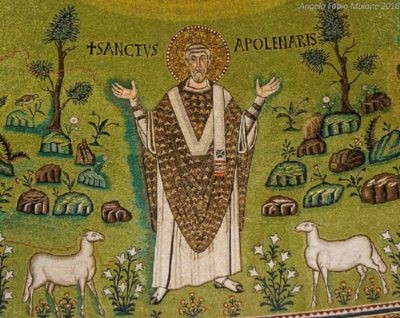– Anastasios
We talked before of Saint Apollinaris [bishop of Hierapolis], a Christian apologist of the second century. Now we talk of another Apollinaris, whom some call “the younger” (310-390). He was a fighter of the Arian doctrine and was very well versed and knowledgeable. Nevertheless he was not exempt from big mistakes, especially for some Christological thesis. These theses were condemned by the Second Ecumenical Council of Constantinople. His error (you may call it heresy) was thus called “Apollinarianism.”
“Apollinaris based his theory on two principles or suppositions, one ontological or objective, and one psychological or subjective. Ontologically, it appeared to him that the union of complete God with complete man could not be more than a juxtaposition or collocation. Two perfect beings with all their attributes, he argued, cannot be one. They are at most an incongruous compound, not unlike the monsters of mythology. Inasmuch as the Nicene faith forbade him to belittle the Logos, as Arius had done, he forthwith proceeded to maim the humanity of Christ, and divest it of its noblest attribute, and this, he claimed, for the sake of true Unity and veritable Incarnation. Psychologically, Apollinaris, considering the rational soul or spirit as essentially liable to sin and capable, at its best, of only precarious efforts, saw no way of saving Christ’s impeccability and the infinite value of Redemption, except by the elimination of the human spirit from Jesus’ humanity, and the substitution of the Divine Logos in its stead. For the constructive part of his theory, Apollinaris appealed to the well-known Platonic division of human nature: body (sarx, soma), soul (psyche halogos), spirit (nous, pneuma, psyche logike). Christ, he said, assumed the human body and the human soul or principle of animal life, but not the human spirit. The Logos Himself is, or takes the place of, the human spirit, thus becoming the rational and spiritual centre, the seat of self-consciousness and self-determination. By this simple device the Laodicean thought that Christ was safe, His substantial unity secure, His moral immutability guaranteed, and the infinite value of Redemption made self-evident. And in confirmation of it all, he quoted from St. John i, 14 ‘and the Word was made flesh’; St. Paul, Phil., ii, 7, ‘Being made in the likeness of men and in habit found as a man, and 1 Corinthians 15:47 The second man, from heaven, heavenly.’ (Sollier, J. (1907). Apollinarianism. Catholic Encyclopedia: http://www.newadvent.org/cathen/01615b.htm).
But we can see that this certainly was against Catholic doctrine as stated clearly by Pope Damasus in 381: “We pronounce anathema against them who say that the Word of God is in the human flesh in lieu and place of the human rational and intellective soul. For, the Word of God is the Son Himself. Neither did He come in the flesh to replace, but rather to assume and preserve from sin and save the rational and intellective soul of man.” We can see that this heresy is one of the many that cannot accept that the Son of God was true man and true God. But he assumed fully our humanity as explained well by Sollier again: “1) Scripture holds that the Logos assumed all that is human — therefore the pneuma also — sin alone excepted; that Jesus experienced joy and sadness, both being properties of the rational soul. 2) Christ without a rational soul is not a man; such an incongruous compound, as that imagined by Apollinaris, can neither be called God-man nor stand as the model of Christian life. 3) What Christ has not assumed He has not healed; thus the noblest portion of man is excluded from Redemption.” (Sollier, J. (1907) op.cit.).
On the other hand, as mentioned earlier, we should not forget the good work also done by this writer, as for example with his paraphrases of the Bible and of the Psalms though certainly, his mistake cannot go unnoticed. In the homily for the midnight Mass in 1977, Paul VI said: “Brothers! Men all! What is Christmas if not this historical event, cosmic, extremely communal because it is addressed to universal proportions, and at the same time incomparably intimate and personal for each of us, because the eternal Word of God, by virtue of which we already live of our natural existence (See Act 17, 23-28), he came in search of us; He eternal has entered into time, He infinite has almost annihilated ‘assuming the condition of servant and becoming similar to men, he appeared in human form, he humbled himself making himself obedient to death, and death on the cross’ (Phil 2:6 ss.). Our ears are – alas! – accustomed to such a message, and our deaf hearts to such a call, a call of love: ‘so God has loved the world …’ (Io 3, 16); rather we are precise: each of us can say with Saint Paul: ‘He loved me and gave his life for me …’! (Gal 2, 20).” (my translation).


 Follow
Follow


